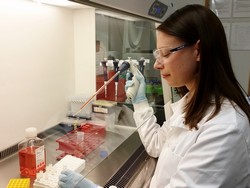New tuberculosis vaccines: From research to application
Mycobacterium tuberculosis (MTB), the bacterium that causes TB, can be treated with antibiotics to some extent, but the emergence of drug-resistant bacterial strains hampers treatment effectiveness. The currently available Bacille Calmette–Guérin (BCG) vaccine is only effective against specific forms of childhood TB and confers no protection to adults. The EU-funded NEWTBVAC (Discovery and preclinical development of new generation tuberculosis vaccines) project, which meanwhile has a follow up in TBVAC2020 was designed to test novel vaccines against MTB. The consortium based their strategy on the European TB vaccine pipeline to identify and forward promising vaccine candidates into the clinical trial stage. Researchers tested previously unknown Mycobacterium antigens in animal models for their ability to raise protective immune responses against the bacteria. Alongside administration routes and doses, new subdominant antigens to achieve the most efficacious combination were identified. They characterised and developed novel adjuvants that could promote the immune response. Partners also explored the development of new live vaccines based on the BCG strain that had impaired vital processes such as intracellular trafficking and nutrient uptake. In addition, new viral vector based vaccines have been developed as booster vaccines. Moreover, the researchers produced new protein based adjuvants focusing on heparin-binding hemagglutinin peptides in particular. For TB-related biomarkers, the objective was to discriminate patients with active disease from those with latent infection at the molecular level. Researchers compared transcriptomic analyses of blood from both groups and unravelled disease-associated gene expression patterns as well as biomarkers related to lung remodelling. A phase I trial of the recombinant VPM1002 candidate vaccine was completed in an endemic area in South Africa. Evaluation of the MTBVAC vaccine candidate in an approved clinical trial in Switzerland will dictate its future use in a clinical setting. The project accelerated the development of approximately 6 novel vaccine candidates to preclinical stage and 4 candidates to early clinical development. The project contributed to approximately 50% of the TB vaccine candidates in the global clinical pipeline. Taken together, the activities of the NEWTBVAC consortium aimed to sustain the TB vaccine research pipeline and advance any promising candidates to clinical stages. The design of decision-making matrices should help in the selection and gating of future vaccine candidates as well as in the stratification of most relevant study populations for future vaccine trials.
Keywords
TB, vaccine, antigens, biomarkers, adjuvants, clinical trial







